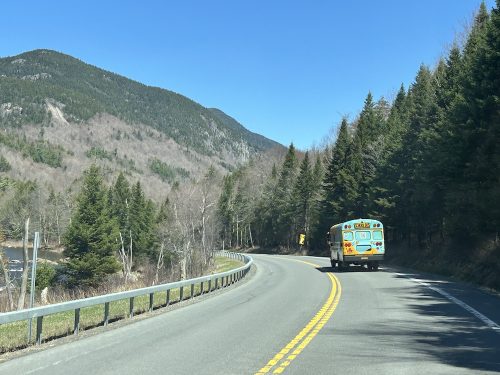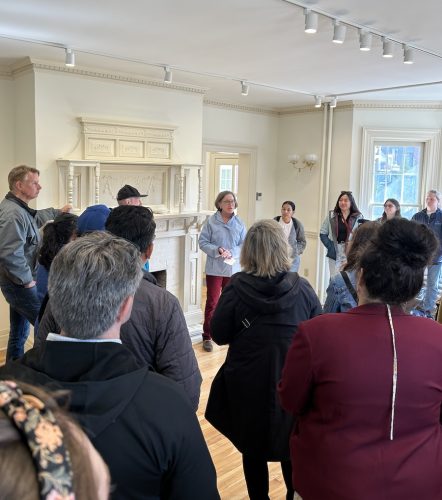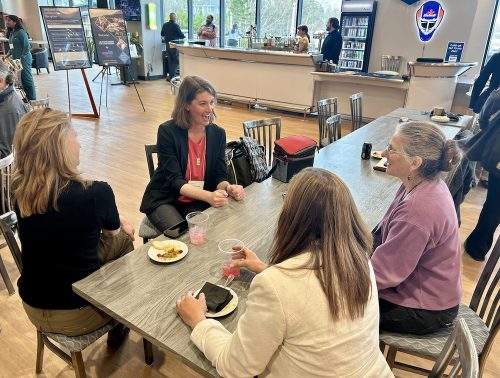By Nicole Draina, ANCA Clean Energy Communications Coordinator
On April 30, 2025, an electric school bus (ESB) stopped in front of the Lake Placid Olympic Center and opened its doors to community leaders, farmers, small business owners, and stakeholders who are strengthening the region’s clean energy and small business future. As the group boarded and the door closed, it signaled the start of ANCA’s 2025 inaugural joint conference: Clean Energy + Small Communities. Big Opportunities.
The ESB, filled to capacity with adults, began navigating the hairpin roads of the North Country. Brookfield Renewables Franklin Falls Hydroelectric Dam would be the first stop on the half day of tours. We began to make our ascent up Whiteface Memorial Highway, with a view of Mackenzie Mountain Wilderness to the southwest.
Dam would be the first stop on the half day of tours. We began to make our ascent up Whiteface Memorial Highway, with a view of Mackenzie Mountain Wilderness to the southwest.
There were some nervous faces on the passengers for this steep incline, reflecting the rumors we so often hear about ESB’s and their battery capabilities with difficult terrain. To our advantage, Chuck O’Neil from NY Bus Sales, who graciously volunteered to drive us that day, informed us that even with a bus full of adults, the battery was only a quarter drained. Now, imagine the lesser battery drain if there were children in the seats instead of us.
After learning about the infrastructure and benefits of hydroelectric, the bus continued to the Village of Saranac Lake, where attendees would participate in a walking tour to demonstrate the successful stories of building a regional economy through small business practices, community collaborations, and clean energy transitions. We heard from local leaders about how they leveraged funding to foster a thriving community — one that has kept its charm by supporting the infrastructure of both the buildings and the people.
Small business owners and nonprofit leaders throughout the village showed us their establishments, while speaking on their successes and struggles of operating in the North Country. Maeghan Farnham, co-owner of St. Regis Canoe Outfitters, told attendees that owning and running a business had seemed daunting. However, the ANCA-led Center for Businesses in Transition (CBIT) made taking over an achievable goal.
Across town, Amy Catania (pictured), executive director of Historic Saranac Lake (HSL), led a tour of the facilities and explained how HSL leveraged tax credits and clean energy funding to revitalize the structures and cut operating costs through energy efficiency measures. She addressed how they took into consideration how certain upgrades might harm historical architectural details and how they navigated around the problem.
and clean energy funding to revitalize the structures and cut operating costs through energy efficiency measures. She addressed how they took into consideration how certain upgrades might harm historical architectural details and how they navigated around the problem.
The walking tour came to a conclusion with a reception at Hotel Saranac. Attendees gathered for drinks while Elizabeth Cooper, ANCA Executive Director, and Kelly Chezum, ANCA Board President, offered a warm welcome to attendees. Afterwards, the ESB ride back to Lake Placid vibrated with the energy of kids going to summer camp — a sure sign that this diverse group of attendees felt welcome at our conference and our region, and were ready to dive into conversations, relationship building, and new collaborations.
The next morning began with opening remarks about the challenges we face — from economic instability, to housing access and the growing unpredictability of our environment. ANCA Clean Energy Program Director Jill Henck offered the conference as a way to reflect on these challenges as individuals and a group, stating “we must work together in harmony” if we want to see change happen throughout our region.
ANCA Small Business Program Director Lauren Richards reinforced these ideals by welcoming everyone to “a forum where these tenacious folks can build community and swap ideas.” It set the tone for the day — that there is meaningful work to be done, starting with the conference as an opportunity to empower our communities through collaborations.
During the next day and a half, attendees would attend a variety of sessions and workshops that aimed to activate the participant voices. Small business owners expressed their concerns about the stressors that come with being a small business owner — how they are often the backbone of economies in rural regions. Farmers and business owners learned about clean energy funding for their enterprises. Leaders spoke about best practices for climate resiliency and future planning. Researchers discussed the complexities of solar and land-use, specifically the challenges faced within the Adirondack Park with regard to ecological preservation.
We heard case studies of how solar + storage could aid communities in emergency situations and decrease health concerns due to fossil fuels (specifically associated with peaker plants). Educators expressed concerns about the trade worker shortage, arguing for the increased need for workforce development and continuing education programs and their solutions to making this education accessible. Business professionals offered advice about balancing personal with community values in the workplace, while still achieving financial sustainability. Interactive workshops encouraged attendees to employ mindfulness to create welcoming spaces for all.
And these are just a glimpse into the conversations that took place during the conference. At the end of the day, “ANCA’s work, at the core, is to serve our community,” Jill Henck remarked. And what better way to serve our community than to invite everyone to work together, learn, and offer networking opportunities.
Sometimes friction comes with navigating these complex situations, but it creates the necessary avenues for growth. There is value to be found in these engagements — even (and especially) the difficult ones.

We saw this first-hand with Northern Lights School (a nonprofit provider of childcare and early childhood education), where multiple grant proposals for an energy efficient heating system were turned down, citing that grant investments would not create jobs or support economic growth. Fortunately, when they were about to lose hope, school leaders were finally awarded a grant from NYS. With grant navigation and technical support from ANCA, the school secured funding for a new geothermal heating system and other energy improvements. From now on, said former board member Ann Armstrong, children will no longer be sent home because the building is too cold. With these long-lasting upgrades, the school now stands to retain jobs and childcare services for generations to come.
In closing, thank you to all who attended, all who strive to make the North Country a viable and vibrant place to live and work.
Garrett Marino, Youth Climate Leadership Coordinator at The Wild Center said it best: “Character is measured through challenge. And challenge is overcome through community, collaboration, and partnerships. I’m certain of one thing, that up here, we face our problems together.”
~~~
View a photo gallery from the conference here!
We hope you’ll join us at our next convening, ANCA’s Annual Meeting on July 25, 2025 in beautiful North Creek, NY. And stay tuned to our newsletter for more opportunities to connect with ANCA, including announcements about a 2026 conference later in the year. Sign up for our monthly e-newsletter here.
